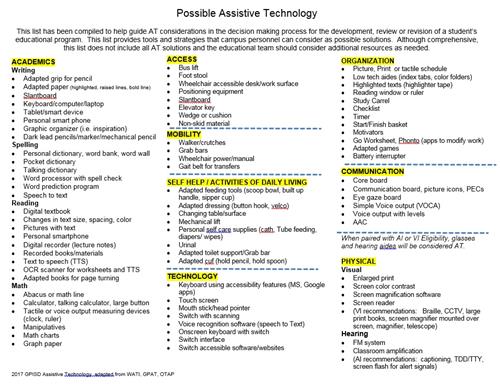-
RELATED SERVICES
Related services are a support that all students with disabilities have a FAPE with education services designed to meet specific individual educational needs. To qualify for related services, the student must show an educational related difficulty which impairs his/her ability to function in the school environment. Assistive Technology is considered a related services.
ASSISTIVE TECHNOLOGY refers not only to high tech devices and computers, but also to items used in daily living that maintain and increase functional capabilities. These include; positioning, computer access, environmental control, augmentative communication, assisted listening, visual aids, mobility, computer based instruction, physical education/play, recreation/leisure and self-care.
300.5 Assistive technology device means any item, piece of equipment, or product system, whether acquired commercially or off a shelf, modified, or customized, that is used to increase, maintain, or improve the functional capabilities of children with disabilities. The term does not include medical device that is surgically implanted or replacement of a medical device (glasses, hearing aid).
Assistive technology is explored in an on-going manner and changes as the needs of student change to meet the curriculum. Areas for consideration include: communication, self-help, mobility/motor, academics, access, technology, sensory, physical/medical, organization, motivation, PE/Rec/Leisure and transition planning.
Assistive technology is considered with every evaluation, REED and IEP meeting. Additional considerations can be completed through an AT staffing which determines the need for a trial and/or screening. If a screening is indicated, parental consent is obtained to determine what is interfering with learning and access and to determine if an assistive technology evaluation is warranted. The screening process includes observation of the student, review of student records, interviews with teachers and parents regarding the reason for referral, review of what has been tried and completion of a screening document designed to identify problems that interfere with school function and participation.
Based on information gathered during the screening, if an evaluation is warranted, it is implemented in accordance with district policy and procedures. Assessment data is gathered from a variety of sources, including a review of existing evaluation data, formal and information evaluation, observation of student and interviews with student, teachers and parents. Once the evaluation has been completed, the AT team members use clinical judgment and evidence based decision making to determine is the use of assistive technology is indicated. All determinations pertaining to eligibility, educational planning, placements, and services to be provided remain the sole responsibility of the IEP committee.
Assistive Technology staffing, screening and/or evaluation are completed by a multi-disciplinary team who has received training in assistive technology. Recommendations are made using evidence based decision making guidelines.

For more information regarding Assistive Technology, please call:
Lauren Nanez
832-386-3767
Select a School...
Select a School
- Cimarron Elementary
- Cloverleaf Elementary
- Galena Park Elementary
- Green Valley Elementary
- Havard Elementary
- Jacinto City Elementary
- MacArthur Elementary
- Normandy Crossing Elementary
- North Shore Elementary
- Purple Sage Elementary
- Pyburn Elementary
- Sam Houston Elementary
- Tice Elementary
- Williamson Elementary
- Woodland Acres Elementary
- Cobb Sixth Grade Campus
- Cunningham Middle
- Galena Park Middle
- North Shore Middle
- Woodland Acres Middle School
- Early College High School
- Galena Park High School
- North Shore 9th Grade Center
- North Shore 10th Grade Center
- North Shore Senior High
- ACE/CFS/ZOTZ
- Curriculum Corner
- Professional Development
- Student Nutrition

